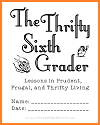In sixth grade, students transition from learning foundational skills to applying them in more complex and analytical ways across all subjects. The learning standards focus on critical thinking, deeper textual analysis, persuasive writing, and advanced mathematical operations like ratios and statistics. In science, students begin structured inquiry and experimentation, while social studies explores broader cultures and historical cause-and-effect.
Classroom teachers can support this by moving beyond rote memorization. They can employ Socratic seminars to debate texts, facilitate project-based learning on historical events, and use real-world data sets for math problems. Differentiating instruction through flexible groups ensures all students are appropriately challenged.
Homeschool parents have the advantage of one-on-one, interest-led learning. They can leverage this by choosing literature that aligns with their child's passions to meet reading standards, incorporating math into daily activities like cooking or budgeting, and using local museums and historical sites for immersive social studies. Online curricula and co-ops can provide structured guidance and crucial social interaction for group projects and discussions.
Both environments succeed by connecting academic standards to the real world, fostering a growth mindset, and providing consistent, constructive feedback on student progress.
|









